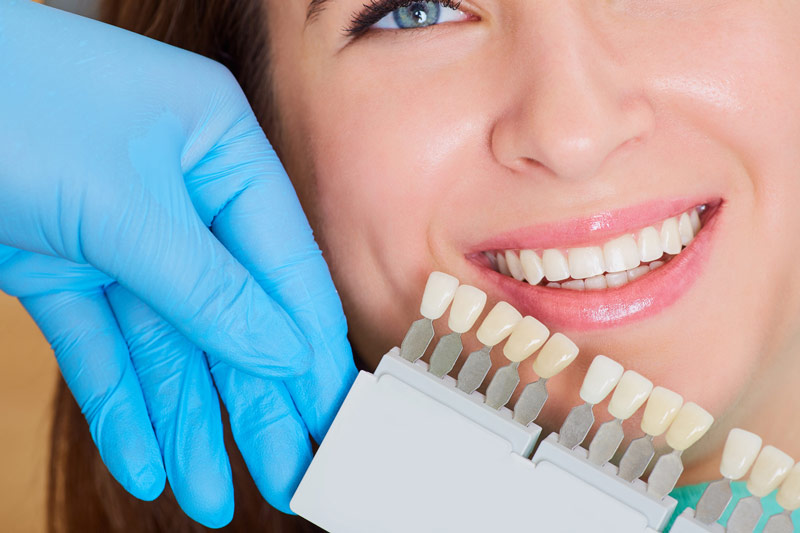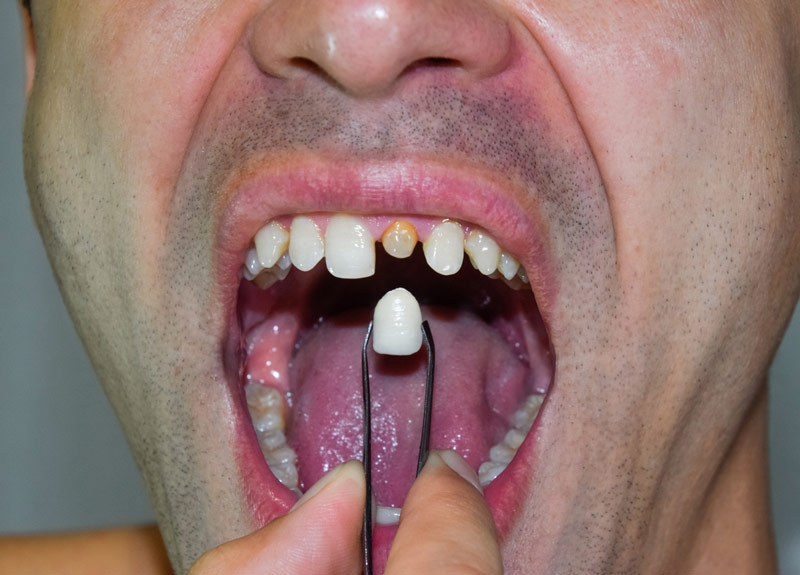What Are the Best Types of Dental Crowns for Teeth?

What Are Dental Crowns?
Commonly known as a cap, a permanent crown is a fixture that completely covers a tooth. There are several materials that dental crowns are made of which can significantly affect the cost—a key factor if you don’t have dental insurance. Once the material has been decided on, the dental crown is fitted to the tooth using dental cement. In order to have a dental crown, a complete underlying tooth isn’t necessary. They are often the more favored choice for covering a broken tooth. Teeth that experience severe decay can also result in the use of a dental crown. Unlike false nails, dental crowns can only be removed by a dental professional. Occasionally, as time goes by, dental crowns may break or come loose but that aside they are incredibly secure.
Crowns are similar to veneers in the sense of how they are made. Quite often, dental crowns are formed in a specialized laboratory and so teeth impressions are required to achieve a custom fit by your dentist. Temporary dental crowns can be inserted until the permanent crowns are completed as part of the dental care. Depending on the reasons behind the dental crowns, a dentist may need to reduce the size of the tooth so that, once the crown is fitted, it sits in line with the surrounding teeth. The end result should look completely natural with a comfortable fit and matching coloration.
Overall, the aim of a dental crown is to cover the tooth underneath. If the root of a tooth is healthy but the rest of the tooth is decayed, broken, or severely discolored then a dental crown will likely be the best option.
The Best Types of Dental Crowns for Teeth
Below are the four types of dental crown available for teeth and what they are used for.
Ceramic: Ceramic is one of the best dental crowns for teeth and is typically used for the front teeth. The reason as to why they are most common for the front teeth rather than the back ones is because of how much easier they are to color match with the neighboring teeth. The ceramic dental crown for teeth is made up of a porcelain-based material. Generally, the ceramic crown does not contain any metal so for those who are allergic to metal, the ceramic crown is probably the best option. Of course, your dentist will be able to better advise you on which crown to opt for.
Porcelain-fused to metal crown: Like veneers, a porcelain material is also used for dental crowns. Porcelain veneers are one of the more expensive options but tend to have a more natural finish. The only downside is that the porcelain material that is used can get damaged and stained slightly easier than the other materials. Because these porcelain crowns are fused with metal, they have a much more secure fitting. All-porcelain crowns are available; however, they aren’t as robust as the metal-fused ones. The addition of the metal structure means that these crowns generally last a lot longer than the all porcelain crowns as well.
Gold alloys: As the name implies, this crown consists of a mix or a combination of metals, typically gold and copper. This type of crown not only enables a secure grip to the tooth, but it is also an incredibly durable material. Cracks and fractures are extremely rare when it comes to gold alloy crowns and the underlying tooth does not erode or crumble. Overall, it is a hard-wearing and safe crown to acquire.
Base metal alloys: The base metal alloys are among the more premium types of dental crowns available for teeth. This model of the crown is renowned for its anti-corrosion ability. The non-noble metals that are used to make this crown are specifically chosen to create an exceptionally strong crown. As far as tooth preparation goes, the base metal alloy crown works similarly to veneers. A small amount of enamel needs to be removed from the tooth so that the crown can get a tight and secure fit.
Why Dental Crowns Are Needed
Dental crowns are needed for multiple reasons, some of which we have outlined below.
- Dental crowns are sometimes used to protect a fragile tooth. A weakened tooth could be a result of tooth decay or an underlying condition. Sometimes, certain medication can weaken the teeth. Cracked teeth are often treated by using a crown to bond the tooth and prevent it from completely snapping.
- Dental crowns are also required for the replacement of a broken tooth or a tooth that is severely worn out.
- Most commonly, dental crowns are the go-to dental procedure when a tooth needs to be completely covered. This could be to simply help and support a tooth which has a large filling or if the tooth is dead and discolored. Again, certain medication can cause discoloration of the teeth.
- Dental crowns are often needed to hold a dental bridge in place.
- They are also a popular choice for covering teeth that are out of shape and uneven.
- Dental crowns are used to cover a dental implant.
- Finally, dental crowns are required to cover a tooth which has been treated with a root canal.
Differences between the best types of dental crowns for teeth are dependent on what material of crown is used for the type of tooth that needs covering. The strength of the tooth that is being covered will also determine the kind of crown that is appropriate. The ultimate goal for all crowns, of course, is to provide a strong seal to prevent any leakages while looking as natural as possible.
Durability is, of course, a big factor to consider when getting a crown at your dental office but the end result and the color match could be more important depending on where it is being placed. With this kind of cosmetic dentistry, the gold and metal alloy crowns stand out above the rest when it comes to durability while other crowns such as the all-porcelain crown are a lot less durable and are, therefore, easier to damage. For this reason, people who are inclined to grind their teeth will be advised against opting for the all-porcelain crown and instead directed toward a sturdier model of crown, much like the porcelain veneers. The porcelain-fused to metal-based crowns provide high resistance to wearing out due to the addition of metal and so they rank between the all-porcelain and the metal alloy crowns. However, as with all dental crowns and bridges, there are some cons to the porcelain fused to metal crowns. In some cases, they have been known to irritate surrounding teeth if the upper surface area becomes coarse. This doesn’t always happen, but unlike the gold and metal alloy crowns, it isn’t unusual.
Though all of the crowns mentioned above are considered permanent, it doesn’t mean that they will stay in place undamaged forever, even with good oral hygiene. Overtime, crowns can become loose and may even fall out depending on your oral health and diet. Regular dental appointments and a thorough oral hygiene routine will help to maintain a healthy crown and prevent any subsequent procedures. For more advice on which dental crown is suitable for you, consult with your dental professional who can guide you through the most effective solutions and the varied cost of dental crowns.
Relate Posts to Read:
Broken Crown? What to Do If You Have a Cracked Dental Crown

